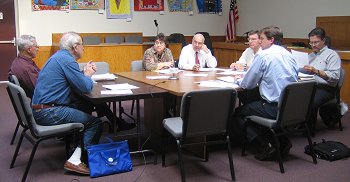- By Dan Veaner
- News
 Print
Print  Lansing's Sewer Committee met Wednesday to report on progress on addressing residents' concerns about the $18.25 million project. They covered a range of issues from land use and zoning, an update on the Memorandum of Understanding (MOU) with the Village of Lansing, the impact of expanding the initial service area, progress on a cost comparison between sewer and septic replacement, and a review of the schedule. And, of course, money.
Lansing's Sewer Committee met Wednesday to report on progress on addressing residents' concerns about the $18.25 million project. They covered a range of issues from land use and zoning, an update on the Memorandum of Understanding (MOU) with the Village of Lansing, the impact of expanding the initial service area, progress on a cost comparison between sewer and septic replacement, and a review of the schedule. And, of course, money.The money was mixed on the money front. Committee members had been hoping to get a loan from Tompkins County, which has been pressuring Lansing to change zoning to encourage affordable housing. But Andy Sciarabba reported that Tompkins County received a ruling from the New York State Attorney General's office that it cannot loan money to one of its municipalities for a project of this kind. The County may grant the money, but chooses not to do so to only one municipality. "That's out of the planning committee," Sciarabba said. "They won't take it back unless we have some other bright ideas."
Sciarabba was frustrated by the ruling, saying that the idea would have been good for the County, generating more in taxes and helping to solve the affordable housing conundrum. "$400,000 on the County's budget -- think about it. That's nothing!" he exclaimed. "And they get paid back, besides!"
He also reported that economic strategies that are important to Cornell include affordable housing for their people. Cornell is the largest employer in Tompkins County. He had also approached the university to contribute to the project, making it more affordable and thus more likely to pass. "It seems to me that Cornell really has to step up," Sciarabba said. "You just can't say that having affordable housing opportunities for their employees without putting something behind it is going to fly any longer. The numbers are very clear -- people can't afford to live here unless we get some affordability of smaller homes and smaller lots. That's where we have to spend out time now."
He recommended working with the Tompkins County Area Development Corporation (TCAD) and the Tompkins County Chamber of Commerce. "The Chamber of Commerce has been a very, very important force in getting certain things off of square one," he noted. "The airport is a good example of that. Certainly they helped get original sewer going. Having them collaborate along with TCAD -- this is an important issue. Maybe we can get some play out of Cornell out of this."
Attorney Mary Chappell reported that the US Department of Agriculture (USDA) Environmental Protection Agency's (EPA) Rural Development Loan and Grants Program has sent her a preliminary eligibility determination for a $5,007,000 loan at 4.125%. She said the project might be eligible for a grant as well, for up to $500,000. The grant could be reduced if other grants are obtained for the project, and Chappell noted that the amount of the grant would depend on the amount of money Rural Development has available after distributing money for loans.
Chappell and Engineer Jim Blum also reported on costs for adding additional neighborhoods to the initial service area. Town Engineer David Herrick summarized the plan when he noted that the cost of the collection system would be doubled, but only add 40% Equivalent Dwelling Units (EDUs). "I look at this as only one aspect of the decision whether to tweak the service area," Blum said. "There are going to be a lot of aspects related to that that will come into play. One would be cost, one would be public opinion, needs -- if there are a lot of (septic) failures."
Blum said that his cost comparison between septic replacement and paying for the sewer is progressing. He showed a map that identified different soil and bedrock conditions in Lansing neighborhoods, and reported that he is developing a series of figures on what replacing septic systems would cost based on that and other conditions. The comparison will show residents what their real costs would be over time if the sewer is not built.

(Clockwise from Left) Noel Desch, Mary Chappell, Andy Sciarabba,
Steve Farkas, David Herrick, Jim Blum, Frank Moore
The meeting ended with a discussion about the impact of not having a sewer in the town. Bruce Kilmartin, the Chief Operating Officer at Transonic Systems, Inc. explained that the company's Lansing facility has grown to 100 employees since it was founded in 1983. "It's going to be very tough to grow and add to the building or more people, because we don't have a sewer," he said. "We're going to be stymied, so we're very interested in the progress of the sewer. We're going to have to make a decision as to whether we will stay or move."
Transonic is in the newly formed Empire Zone, but has been too busy to pursue the benefits of it. "If we had the sewer we could make some more plane," he said. "We just don't know what to do." "That's what you're starting to see now," Sciarabba said. "You're starting to see companies that started out in unsewered areas growing, and there are limitations. If you don't have enough land, what are you going to do?"
The committee discussed specific communications they have received from residents, to make sure that the concerns expressed are being addressed. The next meeting is planned for 5pm on April 11.
----
v3i13



